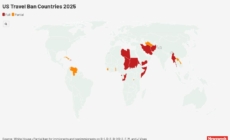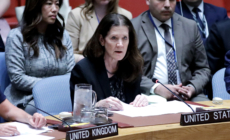-
Map Shows Countries Impacted by Trump’s New Travel Ban - 12 mins ago
-
Who Does Trump’s New Travel Ban Include and Exclude? - 13 mins ago
-
15-year-old, pinned by car, is killed at SoCal high school - 29 mins ago
-
‘Wicked: For Good’ Just Dropped Its Official Trailer: Everything We Know About Part Two - 48 mins ago
-
5 Takeaways From the First N.Y.C. Mayoral Debate - 57 mins ago
-
Hamas Says US Ceasefire Veto Violates ‘American Values’ - about 1 hour ago
-
‘Carol,’ Whose Detention Rattled Her Small Missouri Town, Is Released - 2 hours ago
-
Pali High’s stadium burned. Their Hollywood Bowl graduation is bittersweet - 2 hours ago
-
Jets QB Justin Fields Doesn’t Hold Back About His NFL Future - 2 hours ago
-
Trump Restricts Harvard’s International Students From Entering U.S. - 2 hours ago
Opinion | This Is No Way to Stop the World’s Trumps
Sure enough, Ms. Le Pen’s admirers soon spun the ruling as a tale of malicious muzzling. It was, Mr. Trump wrote on Truth Social, a “witch hunt” and an example of “lawfare.” But this was not an instance of activist judges arbitrarily abusing their position to strike down the top-rated candidate. Though the sentence is severe, comparable bans have been given to politicians of different stripes in recent years, including for financial crimes far smaller in scale. Yet whatever the facts of the matter, the effect has been to turn Ms. Le Pen into a martyr rather than focus public attention on her party’s criminality.
A similar process is playing out in Romania. After a far-right ultranationalist candidate, Calin Georgescu, topped the first round of the presidential election last fall, the results were annulled over alleged campaign finance violations and TikTok’s promotion of his candidacy. In March, the Constitutional Court barred Mr. Georgescu from running again. Elon Musk, speaking for an enraged global right, had labeled the court’s head “a tyrant, not a judge.” In the end, the ban was a blow to the candidate, not to the cause. Another self-described Trumpist candidate, George Simion, now has a strong poll lead for May’s rescheduled contest.
Germany is wrestling with a similar predicament. Some, including over a hundred lawmakers, argue that a ban on the far-right Alternative for Germany party is necessary to stifle a dangerous force whose members include neo-Nazis. But with the party already winning over 20 percent support and rising in opinion polls, outlawing it seems entirely impractical. What’s more, the party has taken steps to avoid legal censure. It recently dissolved its own youth section to skirt a possible ban, and when its most extremist faction came under investigation in 2020, the party formally dissolved it.
Today, even wealthy democracies with long parliamentary traditions seem vulnerable. This is, in part, because of the rise of parties with fascist undercurrents. But it also reflects the deeper hollowing out of democratic participation and confidence in political action itself. Postwar democracies that faced challenges like the Cold War, decolonization and sometimes large-scale political terrorism were riven with major, often violent conflicts. But they also had the strength of mass-membership parties — cornerstones of a system reliant not just on the rule of law or regular electoral contests but also on economic progress, the sense of a better future and democratic competition over the distribution of growth.
Those forms of mass investment in democracy have long since withered. Our post-Cold War, postmodern era has weakened the contest between grand ideological visions or rival economic projects. It has also produced a more fissiparous public realm, with less shared faith in institutions or even the same truths. In this setting, we see the rise of an antipolitical cynicism feeding the far right. It is an anti-establishment attitude that damns the political system as inherently corrupt — but that can forgive critics of that system for their own transgressions, so long as they promise to ax the things that these voters dislike.
Source link



















